Colour Cycle Season 5: StoryCasters TAKEOVER
StoryCasters is a project of Diversity Arts Australia and provides training and mentorship to young culturally diverse digital producers. Visit STORYCASTERS.NET for more.
This season is supported by Multicultural NSW and Create NSW. Diversity Arts also receives core funding from Australia Council for the Arts. StoryCasters trainer/ mentors: Jennifer Macey, Phoenix Eye, Sweatshop Literacy Movement, Nicola Morton, Del Lumanta.
S5 Ep1- Coming to Australia
On this compelling new season of DARTS’ Colour Cycle podcast, led by emerging young digital producers from the Storycasters project, our first episode features gripping stories on the ways overseas-born artists have adjusted to Australia’s arts and culture landscape.
Storycasters graduate Vir Kaula chats with talent from Newcastle-based arts company Octapod, including writer and comedian Elena Terol, painter Cristina Matas and actress and director Stephanie Rochet. The lively foursome share migrant perspectives on navigating a new creative sector, the importance of community and how their individual experiences have shaped their artwork.
Recorded and produced on the lands of the Cabrogal of the Darug nation, the Mulgoa of the Darug Nation and the lands of the Awabakal, Worimi, Wonnarua and Darkinyung peoples. Always was. Always will be. Aboriginal Land.
A production of Diversity Arts Australia.
Guests: Vir Kaula, Elena Terol, Cristina Matas and Stephanie Rochet
Interviewer: Vir Kaula
Research and presentation: Vir Kaula, Claire Cao, Sonia Mehrmand
Season 5 Host: Sonia Mehrmand
Regular Host and Executive Producer: Lena Nahlous
Producers: Sonia Mehrmand and Vir Kaula, with support from Claire Cao and Colin Ho
More information (Hyperlinks to featured orgs / artists / work):
Octapod
Music: Melvin Tu and Ali Saganci
Credits: Thank you to our major partner for this episode, Octapod.
S5 Ep2- Living between cultures
Hear from dynamic women unpacking what it means to live a cross-cultural existence in Australia.
Live from Boundless Festival, StoryCasters podcaster Connie Khoo chats with acclaimed author Alice Pung about how she experiences intercultural relationships, her outstanding writing journey and more. Broadcaster and writer Tanya Ali also sits down with Yorta Yorta musician ALLARA about pride in her identity and making music during a global pandemic. Finally, we hear personal reflections from Storycasters graduates Hannah Lai and Alison Tanudisastro, who shine a light on what it means to be ‘third’ and ‘fourth’ culture kids.
This Colour Cycle season is a takeover by Diversity Arts’ StoryCasters, a collective of young culturally diverse content producers
Recorded and produced on the unceded lands of the Darug and Eora peoples. Always was. Always will be. Aboriginal Land.
A production of Diversity Arts Australia.
Guests: Alice Pung, ALLARA, Hannah Lai and Alison Tanudisastro
Interviewers: Connie Khoo, Alison Tanudisastro, Tanya Ali and Hannah Lai
Research and presentation: Vir Kaula, Claire Cao, Sonia Mehrmand
Season 5 Host: Sonia Mehrmand
Regular Host and Executive Producer: Lena Nahlous
Producers: Sonia Mehrmand and Vir Kaula, with support from Claire Cao and Colin Ho
More information (Hyperlinks to featured orgs / artists / work):
Music: Melvin Tu and Ali Saganci; ALLARA
S5 Ep3- Industry Pipelines
Live from the Fearless Curious event, award-winning journalist and media personality, Marc Fennell speaks with StoryCasters podcaster Sharon Masige about how industry pipelines can be transformed for greater equity. In an equally engaging conversation, Newcastle Art Gallery’s Zana Kobayashi sits down with Storycasters podcaster Vir Kaula to share her experience working in the region’s creative sector and the importance of community action, especially when cultivating change in rural NSW.
This Colour Cycle season is a takeover by Diversity Arts’ StoryCasters, a collective of young culturally diverse content producers.Recorded and produced on the unceded lands of the Cabrogal of the Darug nation, the Mulgoa of the Darug Nation and the lands of the Awabakal, Worimi, Wonnarua and Darkinyung peoples. Always was. Always will be. Aboriginal Land.
Recorded and produced on the unceded lands of the Cabrogal of the Darug nation, the Mulgoa of the Darug Nation and the lands of the Awabakal, Worimi, Wonnarua and Darkinyung peoples. Always was. Always will be. Aboriginal Land.
A production of Diversity Arts Australia.
Guests: Marc Fennell, Zana Kobayashi
Interviewers: Sharon Masige and Vir Kaula
Research and presentation: Vir Kaula, Claire Cao, Sonia Mehrmand
Season 5 Host: Sonia Mehrmand
Regular Host and Executive Producer: Lena Nahlous
Producers: Sonia Mehrmand and Vir Kaula, with support from Claire Cao and Colin Ho
More information (Hyperlinks to featured orgs / artists / work):
Music: Melvin Tu and Ali Saganci
S5 Ep4- Boundless: the joys and insights of literature
Can joy and insights flow from writing, literature, screenwriting and other forms of the craft? Our StoryCasters chat with an eclectic group of storytellers and share stories of their own.
StoryCaster producer Sharon Masige shares a reflective piece on her childhood love of books and the importance of finding representation, while Natesha Somasundaram, a playwright, screenwriter and actor, speaks with broadcaster Tanya Ali about navigating a changing arts space.
Live from Boundless Festival, Sharon chats with award-winning speculative fiction author Eugen Bacon, to talk about her writing process, how her African-Australian identity influences her work, and more. StoryCaster producer Vir Kaula also talks to ABC News journalist Ahmed Yussuf about the importance of creative hubs.
This Colour Cycle season is a takeover by Diversity Arts’ StoryCasters, a collective of young culturally diverse content producers.
Recorded and produced on the unceded lands of the Gadigal of the Eora Nation, the Caborgal of the Darug nation, the Mulgoa of the Darug nation and the Karuna peoples. Always was. Always will be. Aboriginal Land.
A production of Diversity Arts Australia.
Guests: Natesha Somasundaram, Tanya Ali, Eugen Bacon, Ahmed Yussuf
Interviewers: Hannah Lai, Sharon Masige and Vir Kaula
Research and presentation: Vir Kaula, Claire Cao, Sonia Mehrmand
Season 5 Host: Sonia Mehrmand
Regular Host and Executive Producer: Lena Nahlous
Producers: Sonia Mehrmand and Vir Kaula, with support from Claire Cao and Colin Ho
More information (Hyperlinks to featured orgs / artists / work):
Music: Melvin Tu and Ali Saganci
S5 Ep5- Making music in lockdown
COVID-19 has had a devastating impact on the arts sector, and the music industry in particular. Broadcaster and writer Tanya Ali speaks to three incredibly talented musicians about their work and how the pandemic challenged them to transform their creative processes.
Singer and songwriter GLO discusses the creation of her track “Transmute” during one of her state’s many lockdowns and the significance of the Black Lives Matter movement, while Māori artist A.GIRL talks about growing up in Western Sydney and how her childhood has influenced her music. Adelaide-based producer Strict Face also joins Tanya to tell us how the multitude of nightclub shutdowns affected his career and creative process.
This Colour Cycle season is a takeover by Diversity Arts’ StoryCasters, a collective of young culturally diverse content producers.
Recorded and produced on the unceded lands of the Gadigal of the Eora Nation, the Caborgal of the Darug nation, the Mulgoa of the Darug nation and the Karuna peoples. Always was. Always will be. Aboriginal Land.
A production of Diversity Arts Australia.
Guests: GLO, A.GIRL, Strict Face
Interviewer: Tanya Ali
Research and presentation: Vir Kaula, Claire Cao, Sonia Mehrmand
Season 5 Host: Sonia Mehrmand
Regular Host and Executive Producer: Lena Nahlous
Producers: Sonia Mehrmand and Vir Kaula, with support from Claire Cao and Colin Ho
More information (Hyperlinks to featured orgs / artists / work):
Music: GLO, A.GIRL, Strict Face, Melvin Tu and Ali Saganci
S5 Ep6- From Western Sydney to Newcastle: art making and producing
On this episode of DARTS’ StoryCasters-led Colour Cycle podcast, we partner up with Newcastle, NSW-based arts organisation, Octapod, to talk to five regional artists about working in the arts outside metropolitan areas. Western Sydney StoryCaster producer Vir Kaula hosts an important discussion about the strength of the local community and what it’s like being an artist in the Greater Newcastle region.
We’ll meet Octapod talents Indeah Clark and Tamahae Puha, the duo behind the Skux Az, an art collective focused on bringing dynamic and more ‘unconventional’ art into Maitland. Also, Jamie Bastoli, a multidisciplinary artist, discusses finding a supportive community, and Gunggandji photographer, DJ and visual artist Wanjun Carpenter speaks about the political power of art. Vir is also joined by actor and theatre maker Roger Ly, talking about the value of producing art for multicultural communities.
This Colour Cycle season is a takeover by Diversity Arts’ StoryCasters, a collective of young culturally diverse content producers.
Produced on the unceded lands of the Cabrogal and Mulgoa of the Darug nation and the lands of the Awabakal, Worimi, Wonnarua and Darkinyung peoples. Always was. Always will be. Aboriginal Land.
A production of Diversity Arts Australia.
Guests: Skux Az (Indeah Clarke and Tamahae Puha), Wanjun Carpenter, Jamie Bastoli, Roger Ly
Interviewer: Vir Kaula
Research and presentation: Vir Kaula, Claire Cao, Sonia Mehrmand
Season 5 Host: Sonia Mehrmand
Regular Host and Executive Producer: Lena Nahlous
Producers: Sonia Mehrmand and Vir Kaula, with support from Claire Cao and Colin Ho
More information (Hyperlinks to featured orgs / artists / work):
Music: Melvin Tu and Ali Saganci
Thank you to our major partner in this episode, Octapod.
S5 Ep7- Communities of practice
How does it feel to be surrounded, supported, and inspired by community?. We hear from Sarah Ayoub, a freelance journalist and author of young adult novels including The Yearbook Committee and The Cult of Romance, as well as StoryCaster graduates Annie Brockenhuus-Schack, Sarah Mendoza, and Hannah Lai, a group of passionate creatives exploring the significance of community and collaborative art.
This Colour Cycle season is a takeover by Diversity Arts’ StoryCasters, a collective of young culturally diverse content producers.
Produced on the unceded lands of the Darug and Eora nations. Always was. Always will be. Aboriginal Land.
Guests: Sarah Ayoub, Annie Brockenhuus-Schack, Brieze (vox pop), Sarah Mendoza, and Hannah Lai.
Interviewer: Sarah Mendoza, Alison Tanudisastro, Sharon Masige
Research and presentation: Vir Kaula, Claire Cao, Sonia Mehrmand
Season 5 Host: Sonia Mehrmand
Regular Host and Executive Producer: Lena Nahlous
Producers: Sonia Mehrmand and Vir Kaula, with support from Claire Cao and Colin Ho
More information (Hyperlinks to featured orgs / artists / work):
Music: Melvin Tu and Ali Saganci
The Colour Cycle: Esteemed UK and Australian artists share WHO ARE WE NOW? in this special season!

This podcast was produced on the unceded lands of the Boon Wurrung people of the Kulin nation, and the Gadigal and Wangal people of the Eora Nation. We pay our respects to Elders past, present and emerging. Always was. Always will be. Aboriginal Land.
As part of British Council’s UK/AUS Season, Diversity Arts Australia (DARTS) is proud to present a new season of The Colour Cycle podcast spotlighting synergy between trailblazing female creatives in the UK and Australia!
Four insightful episodes—titled UK/AUS – This is Who We Are (Part One)—emphasise the experiences of women of colour and Indigenous women working in the arts and creative industries in the UK and Australia. The guests share cross-cultural knowledge, unpack the differences between regions, the notion of resilience, existing as women in artistic spaces and what they’ve learned throughout their careers.
Novelist and producer Sharmilla Beezmohun and filmmaker and broadcaster Pearl Tan (Pearly Productions)
This podcast is a collaboration with This Is Who We Are, a UK-Australian movement of intergenerational & intersectional women artists, producers and creatives of colour who are transforming sectors, thinking and spaces.Co-directors Melanie Abrahams (Director. Renaissance One), Paula Abood (Director of The Third Space), Lena Nahlous (Executive Director of Diversity Arts Australia and host of The Colour Cycle podcast), Nur Shkembi (Melbourne based curator, writer and scholar). Festival Curator Melanie Abrahams Project Manager: Sarah Dara. Producer Renaissance One.
This season is available on our website below or on all good listening platforms: iTunes, Spotify, Whooshka, Patreon, Pocket Casts, PlayerFM, Stitcher and Listen Notes.
Support Diversity Arts on Patreon to help us continue to deliver our Colour Cycle podcast series.
Episode 1: This is Who We Are – Deborah Cheetham & Chi-chi Nwanoku on transforming classical music
This episode brings together Professor Deborah Cheetham AO, First Nations Creative Chair of the Melbourne Symphony Orchestra and producer of Australia’s first Indigenous opera, and Chi-chi Nwanoku OBE, founder of the first professional orchestra in Europe to be made up of a majority of Black, Asian and ethnically diverse musicians. These two trailblazing women talk about their decades-long careers, decolonising systems and breaking down doors in Australian and UK classical music.
Both speak to Melanie Abrahams who is our partner on this project, creative director and curator with Renaissance One in the UK.
Music: Threads of Existence, part three of a composition from Deborah Cheetham’s Woven Song – Pukumani series.
More background information:
Episode 2: Women, Hip Hop and Resilience – MC Trey (AUS), DJ Sarah Love (UK) and Maya Jupiter (USA)
In this episode we’re speaking to three award-winning women of the Hip Hop world across three continents. These pioneers discuss working across regions, why community is integral to Hip Hop, and what resilience means to them.
In Australia is MC Trey, a pacesetter in the world of hip hop whose legacy spans 20 years of music about everyday life, love and her Pacific community. In London is one of the busiest award-nominated aficionados of hip hop, DJ Sarah Love who’s also a broadcaster, TV presenter and journalist. In California is Maya Jupiter who was born in La Paz to a Mexican father and Turkish mother. She grew up in Australia where she fell in love with Hip Hop, later dropping three albums and hosting music shows on TV and radio.
Guests (in order of appearance): MC Trey, DJ Sarah Love, Maya Jupiter
Host and Interviewer: Lena Nahlous
Producer: Nadyat El Gawley
Vocals: Maya Jupiter, Mia Xitlali and Sandino González-Flores.
Qanoon and Oud: Halim Al-khatib
Drums: Evan Cristo,
Bass: Juan “El Unico” Perez,
Keyboard: Quincy McCrary
Guitar: Quetzal Flores.
Video Production: Abby VanMuijen of RogueMark Studios, Art by Eliza Reisfeld and Animation by Marisa Rafter
More information
This podcast is in collaboration with This Is Who We Are, a UK-Australian movement of intergenerational & intersectional women artists, producers and creatives of colour who are transforming sectors, thinking and spaces.
Episode 3: This is Who We Are – Things They Never Told Me
In this episode, we’re peering a little into our personal lives today with some quick vox pops from artists and creatives. Our question: What is something we learnt about later in life, that we wish somebody in our lives had told us about? It could have come from our mothers, fathers, extended family, or people we came across growing up.
UK performance artist Aleasha Chaunte considers becoming a parent and what she learned from her mother and family; and Sharmilla Beezmohun talks about how she wishes she knew that the older we get, the less we know.
Guests (in order of appearance): Aleasha Chaunte, Jennifer Lee Tsai, Dj Sarah Love, MC Trey, Maya Jupiter, Sharmilla Beezmohun, Pearl Tan
Interviewers: Lena Nahlous and Melanie Abrahams
Host: Lena Nahlous
Producer: Nadyat El Gawley
Co-written by MC Trey (Australia) and Savuto (Fiji) / TAPASTRY ©
Video shot by Only Ideas Studio, Fiji.
This podcast is a collaboration with This Is Who We Are, a UK-Australian movement of intergenerational & intersectional women artists, producers and creatives of colour who are transforming sectors, thinking and spaces.
Episode 4: Ask the other question – unpacking intersectionality
This episode we’re unpacking intersectionality. What is it? Why is it important, and what does it mean to live an intersectional life?
In London, freelancer, editor and novelist Sharmilla Beezmohun (Co-founder of independent literature organisation Speaking Volumes) unpacks the question with Sydney filmmaker Pearl Tan, a lecturer in directing at the Australian Film, Television and Radio School, who is studying for a PhD looking at the intersectional experience of diversity workers in the screen industry. Later on in the show, UK based independent producer and curator Melanie Abrahams chats to poet and playwright Chérie Taylor Battiste on the lived experience of intersectionality.
Guests (in order of appearance): Pearl Tan, Sharmilla Beezmohun, Chérie Taylor Battiste
Interviewers: Lena Nahlous and Melanie Abrahams
Host: Lena Nahlous
Producer: Nadyat El Gawley
More information:
This podcast is a collaboration with This Is Who We Are, a UK-Australian movement of intergenerational & intersectional women artists, producers and creatives of colour who are transforming sectors, thinking and spaces.
UK/AUS This is Who We Are (Part One) - List of Episodes
The Colour Cycle podcast SEASON 3 is here!
This new season of The Colour Cycle is centred around “Concrete Strategies for Racial Equity.” We cover a huge breadth of content: the impacts of Covid-19 on artists, global anti-racism movements such as Black Lives Matter and Stop Asian Hate, the necessity of diversity standards, the power of Indigenous music in retaining language, and the importance of allyship and leadership networks. The season also features a series of conversations with UK creative industry thought-leaders, in partnership with British Council Australia. Featuring: Writer/ broadcaster Benjamin Law; Executive Director, Creative Diversity Network UK Deborah Williams; Noongar singer/songwriter Gina Williams; Head of Inclusion, British Film Institute Jennifer Smith; artist and refugee advocate Safdar Ahmed; writer/performer Moreblessing Maturure; Senior Manager, Aboriginal Strategy and Engagement at Create NSW Peter White; Asian Australian Alliance Founder Erin Chew; local media legend Sunil Badami + MORE.
Season 3 of the Colour Cycle is available on our website below or on all good listening platforms: iTunes, Spotify, Whooshka, Patreon, Pocket Casts, PlayerFM, Stitcher and Listen Notes.
The opening and closing track “You know What” was written by UK based musician Spider J. Heartfelt thanks to Information and Cultural Exchange for providing us with a recording studio.
Support Diversity Arts on Patreon to help us continue to deliver our Colour Cycle podcast series.
The Colour Cycle – Season 3
Episode 1: How to be Anti-Racist in the Arts
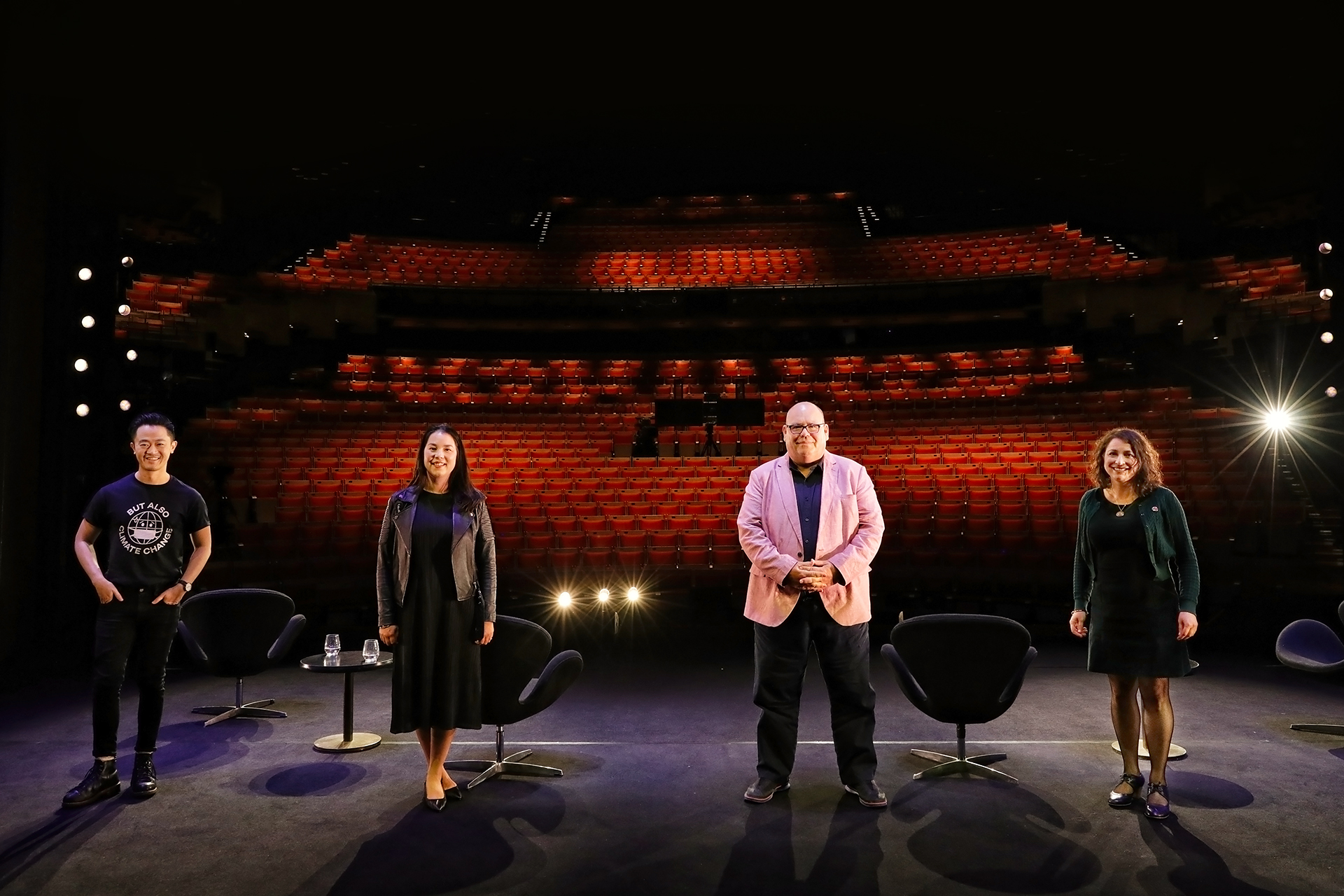
In 2020, Diversity Arts Australia and British Council launched the Creative Equity Toolkit (www.creativeequitytoolkit.org), a how-to resource that supports organisations in reaching diversity goals. This episode was filmed at the Toolkit launch at Sydney Opera House. It features conversations about the global anti-racism movements of 2020, allyship, building alliances between the culturally diverse immigrant space and First Nations movements and practical strategies for making change in the creative sector. Panel: Peter White (Senior Manager, Aboriginal Strategy and Engagement at Create NSW), Benjamin Law (writer and broadcaster) and Mikala Tai (Head of Visual Arts, Australia Council for the Arts). Spotlight: Writer-filmmaker Katrina Irawati Graham.
Episode 2: I Am Not A Virus – anti-Asian Covid racism
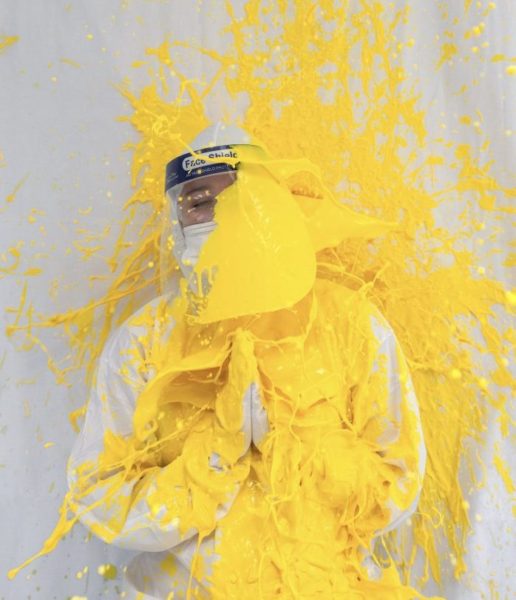
The Covid-19 pandemic saw a surge of Anti-Asian racism. In response, Diversity Arts Australia launched I Am Not A Virus, an artist-led project that provides powerful counter-narratives to xenophobia and racism. This episode spotlights interviews from Asian artists, partners and curators from the I Am Not A Virus project, along with two spoken word pieces that were commissioned as part of the project. Featuring: Erin Wen Ai Chew (founder of Asian Australian Alliance and Being Asian Australian), artists Jacqueline Pon, Sean Stephen Ryan, Jayanto Tan, Andrea Srisurapon, 4A Centre for Contemporary Asian Art curator Reina Takeuchi, and works by Kelly Huynh and Jasper Lee-Lindsay.
Episode 3: Gina Williams – Reviving and celebrating Indigenous languages through music

What is the power of language? How does the language we speak inform artistic practice? What do you do when the State has historically attempted to erase that language? Our special guest this episode is singer-songwriter and British Council ACCELERATE alumni Gina Williams, who creates contemporary music in her Indigenous Noongar language with her musical partner Guy Ghouse. Gina talks about the power of music to celebrate culture and pass it down to future generations. Support Gina and buy her albums HERE. Learn more about British Council Australia HERE.
Episode 4: Global Conversations – giving audiences the screen and stage diversity they want
The past two years have seen worldwide changes in the ways we talk about racial and cultural representation. Contemporary audiences are increasingly seeking out and demanding greater diversity in our screen and performing arts sectors. 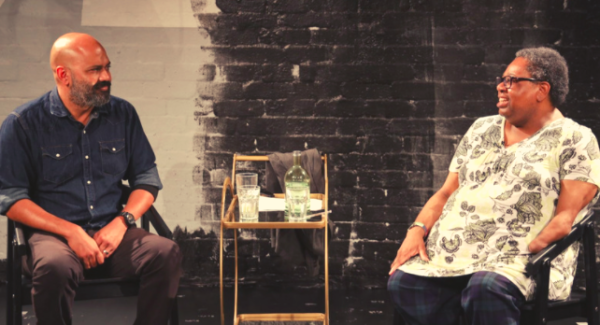 Writer/broadcaster Sunil Badami talks to CEO of Creative Diversity Network (UK) Deborah Williams about how things are shifting globally. As the former Diversity Manager at the British Film Institute (BFI), Deborah designed the diversity standards for film and broadcasting in the UK and has a wealth of insight when it comes to the creative sector. We also speak to Refugee Art Project’s Safdar Ahmed about the impacts of Covid 19 on his artistic practice and the communities he works with. Thank you to the British Council, Creative Victoria, Screen Australia, Belvoir Street Theatre and The Wheeler Centre for hosting and supporting Deborah’s visit to Australia in 2019.
Writer/broadcaster Sunil Badami talks to CEO of Creative Diversity Network (UK) Deborah Williams about how things are shifting globally. As the former Diversity Manager at the British Film Institute (BFI), Deborah designed the diversity standards for film and broadcasting in the UK and has a wealth of insight when it comes to the creative sector. We also speak to Refugee Art Project’s Safdar Ahmed about the impacts of Covid 19 on his artistic practice and the communities he works with. Thank you to the British Council, Creative Victoria, Screen Australia, Belvoir Street Theatre and The Wheeler Centre for hosting and supporting Deborah’s visit to Australia in 2019.
Episode 5: Cultural Markers and Visibility in the arts – a UK/Australia conversation
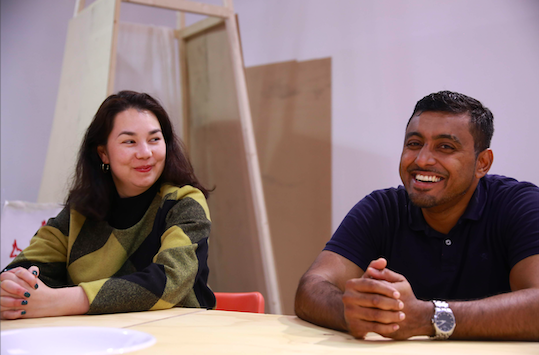
Diversity Arts Australia and British Council joined forces to run INTERSECT, a knowledge-exchange program between Australia and the UK which connected culturally diverse and First Nations arts and screen leaders from both countries. This episode we talk to INTERSECT participants about how they “put down cultural markers” in their respective sectors to affect long-term change, making diversity a vital part of core business rather than just a “side dish.” Featuring: INTERSECT participants Abdul Shayek (Theatre Director and Artistic Director of FIO), Nike Jonah (Executive Director of the Pan-African Creative Exchange) and Mikala Tai (former Director of 4A Centre for Contemporary Asian Art). Spotlight: Sydney-based artist Ayebatonye. The INTERSECT program is a joint program between the British Council and Diversity Arts Australia with support from Creative Victoria and Create NSW. Alison Tanudisastro’s interview with Ayebatonye was recorded at a We Are The Mainstream event. Thank you to all our partners!
Episode 6: Screen Targets and Standards – do they work?
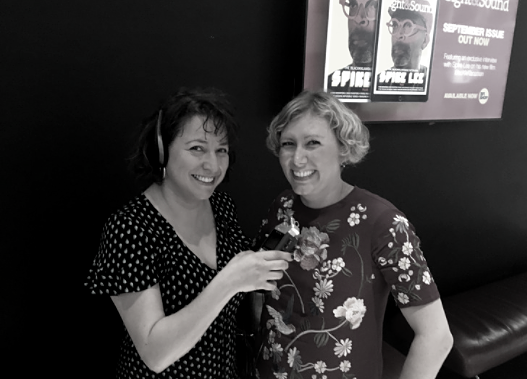 Can we increase cultural diversity on and behind our screens through official diversity standards? How necessary and effective are standards and targets? Lena Nahlous explores these questions by speaking to the Head of Inclusion at the British Film Institute (BFI) Jennifer Smith and Australian filmmaker Pearl Tan, a participant in British Council’s INTERSECT program. Spotlight: writer and co-founder of The Pvblication Lamisa Haque
Can we increase cultural diversity on and behind our screens through official diversity standards? How necessary and effective are standards and targets? Lena Nahlous explores these questions by speaking to the Head of Inclusion at the British Film Institute (BFI) Jennifer Smith and Australian filmmaker Pearl Tan, a participant in British Council’s INTERSECT program. Spotlight: writer and co-founder of The Pvblication Lamisa Haque
Episode 7: The Importance of Physical Spaces to Create and Connect
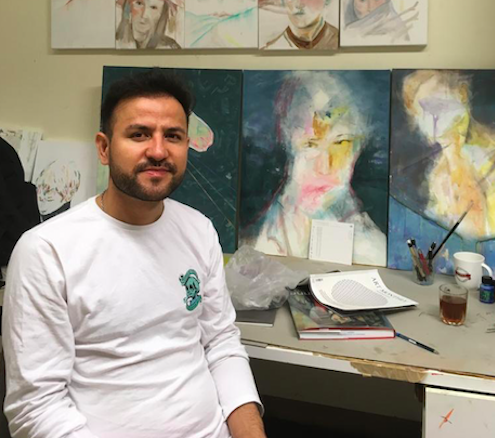
The creation of physical spaces — theatres, film companies and galleries — is integral to showcasing the work of culturally diverse artists and true pluralism of Australia. This episode explores the need for these spaces, with a particular focus on a diverse creative hub in Adelaide called Nexus Arts. We also ask: what happens when a global pandemic shuts down these critical centres for creation and connection? Featuring: Refugee Art Project’s Zeinab (Sara) Mir, the Diverse Screens panel discussion at Adelaide Fringe Festival, poet and painter Elyas Alavi, and emerging artist Yusuf Ali Hayat.
Episode 8: Overcoming the Imaginings of Others
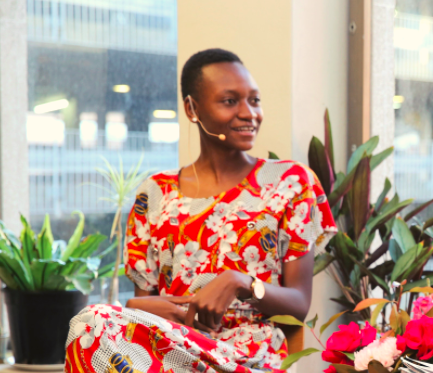 Lena Nahlous talks to multidisciplinary artist, activist, Ted x speaker and creative director of FOLK magazine Moreblessing Maturure about fighting erasure, the importance of having spaces to experiment and create, and the need for critics of colour. Spotlight: singer-songwriter and performer Zaya Barroso. Thank you to the Future Women, the City of Parramatta and Parramatta Artist Studios for hosting the talk! Alison Tanudisastro’s interview with Zaya was recorded at a We Are The Mainstream event.
Lena Nahlous talks to multidisciplinary artist, activist, Ted x speaker and creative director of FOLK magazine Moreblessing Maturure about fighting erasure, the importance of having spaces to experiment and create, and the need for critics of colour. Spotlight: singer-songwriter and performer Zaya Barroso. Thank you to the Future Women, the City of Parramatta and Parramatta Artist Studios for hosting the talk! Alison Tanudisastro’s interview with Zaya was recorded at a We Are The Mainstream event.
Bonus Episode: How to Engage Diverse Audiences
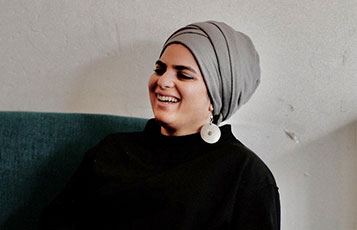 Lena Nahlous interviews poet and theatre producer Zainab Syed, who tells us about how she successfully engaged Muslim communities in Western Australia. The episode focuses on Performing Lines WA’s staging of Layla Majnun, a solo show devised by diverse and emerging artists from WA and featuring US Farsi scholar and storyteller Ustaadh Feraidoon Mojadedi. Zainab reveals how she brought in both Muslim and non-Muslim audiences in huge numbers by considering everything from venue and staff training to strategic marketing.
Lena Nahlous interviews poet and theatre producer Zainab Syed, who tells us about how she successfully engaged Muslim communities in Western Australia. The episode focuses on Performing Lines WA’s staging of Layla Majnun, a solo show devised by diverse and emerging artists from WA and featuring US Farsi scholar and storyteller Ustaadh Feraidoon Mojadedi. Zainab reveals how she brought in both Muslim and non-Muslim audiences in huge numbers by considering everything from venue and staff training to strategic marketing.This panel was a part of the 2020 Australian Performing Arts Exchange (APAX), and was facilitated and recorded by Catherine Conner and the team at PAC Australia. At the time of this interview, Zainab was creative producer at Performing Lines WA and is now producer at Belvoir Street Theatre in Sydney.
Bonus Episode: Racism in the arts – reform or revolution?
 In 2020, Sydney Arts Management Group (SAMAG) facilitated a panel asking what was the role and responsibility of the creative sector in the fight for racial justice. Hosted by Diversity Arts’ Lena Nahlous, the talk featured leading activists, artists and community leaders, who explored whether we should take the path of reform or instead “blow it all up” and completely rethink our industry structures? Listen on for an insightful conversation about how arts and cultural organisations can work with Indigenous and culturally diverse peoples in meaningful ways that transcend mere symbolism.
In 2020, Sydney Arts Management Group (SAMAG) facilitated a panel asking what was the role and responsibility of the creative sector in the fight for racial justice. Hosted by Diversity Arts’ Lena Nahlous, the talk featured leading activists, artists and community leaders, who explored whether we should take the path of reform or instead “blow it all up” and completely rethink our industry structures? Listen on for an insightful conversation about how arts and cultural organisations can work with Indigenous and culturally diverse peoples in meaningful ways that transcend mere symbolism.
Season 3 - List of episodes
-
How to be Anti-Racist in the Arts
-
I Am Not A Virus: anti-Asian Covid racism
-
Gina Williams: Reviving and celebrating Indigenous languages through music
-
Global Conversations: giving audiences the screen and stage diversity they want
-
Cultural Markers and Visibility in the arts: a UK/Australia conversation
-
Screen Targets and Standards – do they work?
-
The Importance of Physical Spaces to Create and Connect
-
Overcoming the Imaginings of Others
-
Bonus Ep: How to Engage Diverse Audiences
-
Bonus Ep: Racism in the arts – reform or revolution?
It’s here! The Colour Cycle podcast SEASON 2!
The Colour Cycle Podcast is packed with important ideas, strategies and insights from leading thinkers in the arts. If you’re committed to equity in the creative sectors, then you don’t want to miss this. This season features a special recording of Fair Play season live at the Diversity Arts Symposium, Wheeler Centre in Melbourne.
We’re sharing these thought-provoking and courageous conversations far and wide. Conversations and experiences from First Nations trail blazers Genevieve Grieves and Tony Briggs, international guests like Deborah Williams from the UK’s Creative Diversity Network, Disability leader, artist Caroline Bowditch, Aseel Tayah, Paula Abood, and many more.
Listen to the Season 2 trailer and The Fair Play Season 2 episodes kicking off with Episode 1: First Peoples First on our website below or on all good listening platforms – iTunes, Spotify, Whooshka, Patreon, Pocket Casts, PlayerFM, Stitcher and Listen Notes.
Legendary hip-hop and soul artist MC Trey composed our title track.
Support Diversity Arts on Patreon to help us continue to deliver our Colour Cycle podcast series.
The Colour Cycle – Season 2
Episode 1: First Peoples First
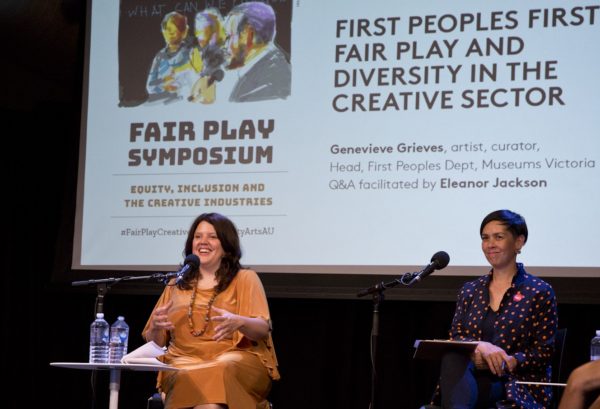 First People’s First, how do cultural organisations, institutions and arts practitioners put this principle into practice in ways that move beyond tokenism? This is one of the critical issues unpacked in depth by Genevieve Grieves. Genevieve is a Worimi woman from southeast Australia based in Naarm, sometimes known as Melbourne. She’s an award-winning artist, curator and the Manager, Transformation Strategies in the First Peoples Department at Museums Victoria. This is her keynote address from the Fair Play Symposium, two days of talks and performances put on by Diversity Arts Australia at The Wheeler Centre. https://player.whooshkaa.com/episode/593967 Thanks to all of our Fair Play symposium partners: co-presenter The Wheeler Centre, core funder Creative Victoria, sponsors Ai-Media, British Council, Screen Australia. Koorie Heritage Trust Inc, Arts Access Victoria, Multicultural Arts Victoria, Arts Front, Feral Arts, Regional Arts Victoria, Abbotsford Convent, Footscray Community Arts Centre.
First People’s First, how do cultural organisations, institutions and arts practitioners put this principle into practice in ways that move beyond tokenism? This is one of the critical issues unpacked in depth by Genevieve Grieves. Genevieve is a Worimi woman from southeast Australia based in Naarm, sometimes known as Melbourne. She’s an award-winning artist, curator and the Manager, Transformation Strategies in the First Peoples Department at Museums Victoria. This is her keynote address from the Fair Play Symposium, two days of talks and performances put on by Diversity Arts Australia at The Wheeler Centre. https://player.whooshkaa.com/episode/593967 Thanks to all of our Fair Play symposium partners: co-presenter The Wheeler Centre, core funder Creative Victoria, sponsors Ai-Media, British Council, Screen Australia. Koorie Heritage Trust Inc, Arts Access Victoria, Multicultural Arts Victoria, Arts Front, Feral Arts, Regional Arts Victoria, Abbotsford Convent, Footscray Community Arts Centre.
Episode 2: Towards Creative Sector Self-Determination
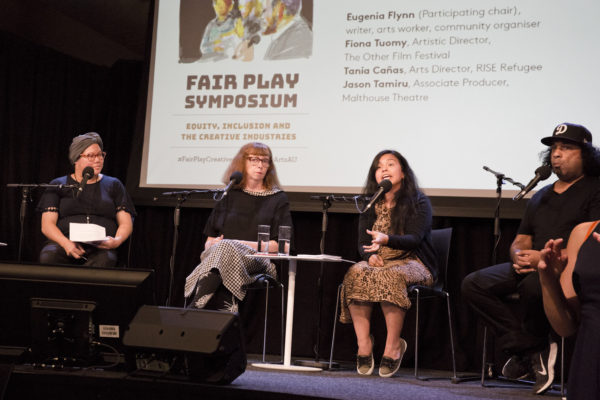 Has representation become a buzzword? The representation box is often ticked when “People of Colour”, “First Nations” people and “People With Disability” are ‘invited into’ the conversation for a moment. But how can we create real systemic change? Tune in to the panel: Towards Creative Sector Self-Determination from our Fair Play symposium at the Wheeler Centre. Panelists: Eugenia Flynn (Participating Chair + Fair Play Creative Producer), Fiona Tuomy (Artistic Director, The Other Film Festival), Tania Canas (Performer, lecturer at the Victorian College of the Arts, RISE Refugee member) and Jason Tamiru (Proud Yorta Yorta man, Associate Producer, Malthouse Theatre).
Has representation become a buzzword? The representation box is often ticked when “People of Colour”, “First Nations” people and “People With Disability” are ‘invited into’ the conversation for a moment. But how can we create real systemic change? Tune in to the panel: Towards Creative Sector Self-Determination from our Fair Play symposium at the Wheeler Centre. Panelists: Eugenia Flynn (Participating Chair + Fair Play Creative Producer), Fiona Tuomy (Artistic Director, The Other Film Festival), Tania Canas (Performer, lecturer at the Victorian College of the Arts, RISE Refugee member) and Jason Tamiru (Proud Yorta Yorta man, Associate Producer, Malthouse Theatre).
Episode 3: Diversifying Screen and Stage – Deborah Williams
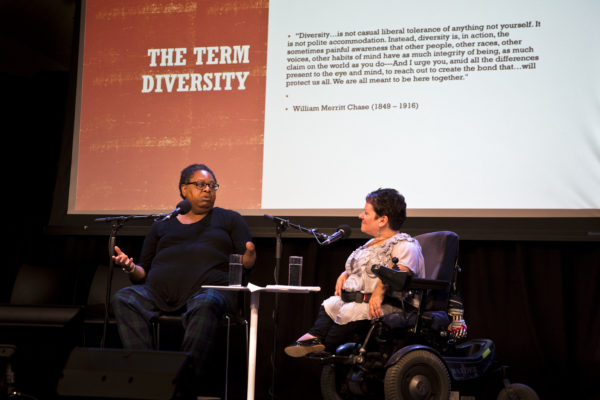 Tune in to Diversifying Screen and Stage with Deborah Williams, artist and CEO of the Creative Diversity Network (CDN) in conversation with performer, teacher and CEO of Arts Access Victoria Caroline Bowditch at The Wheeler Centre for Books, Writing and Ideas for Diversity Arts’ Fair Play season. Deborah Williams tackles assumptions about gender, race, disability and class through screen and stage work in this week’s episode of The Colour Cycle.
Tune in to Diversifying Screen and Stage with Deborah Williams, artist and CEO of the Creative Diversity Network (CDN) in conversation with performer, teacher and CEO of Arts Access Victoria Caroline Bowditch at The Wheeler Centre for Books, Writing and Ideas for Diversity Arts’ Fair Play season. Deborah Williams tackles assumptions about gender, race, disability and class through screen and stage work in this week’s episode of The Colour Cycle.
Episode 4: State of Play – Equity and Inclusive Practices
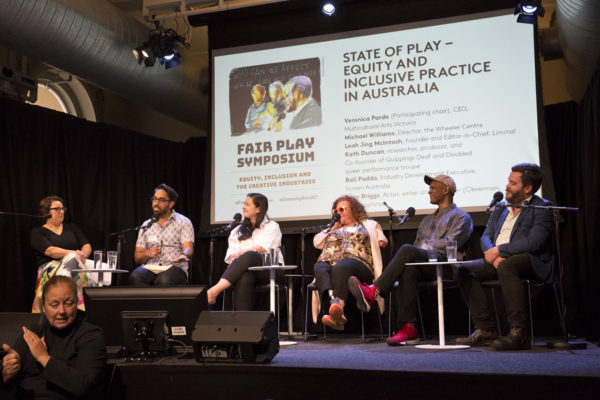 So what is the status quo in terms of access and inclusion in Australia’s creative sector for people from First Nations backgrounds, People with Disability and culturally and linguistically diverse or migrant communities? How do you dismantle existing systems and structures of power? These are just some of the issues tackled by this panel on the ‘State of Play – Equity and Inclusive Practices’ in this week’s episode of The Colour Cycle. Featuring panelists: Veronica Pardo (Participating Chair, CEO – Multicultural Arts Victoria), Tony Briggs (Acclaimed actor, writer, producer – Cleverman, The Sapphires), Michael Williams (Director – Wheeler Centre), Leah Jing McIntosh (Founder and editor-in-chief – Liminal), Bali Padda (Industry Development Executive – Screen Australia) and Kath Duncan (Researcher, producer, co-founder – Quippings deaf and disabled queer dance troupe).
So what is the status quo in terms of access and inclusion in Australia’s creative sector for people from First Nations backgrounds, People with Disability and culturally and linguistically diverse or migrant communities? How do you dismantle existing systems and structures of power? These are just some of the issues tackled by this panel on the ‘State of Play – Equity and Inclusive Practices’ in this week’s episode of The Colour Cycle. Featuring panelists: Veronica Pardo (Participating Chair, CEO – Multicultural Arts Victoria), Tony Briggs (Acclaimed actor, writer, producer – Cleverman, The Sapphires), Michael Williams (Director – Wheeler Centre), Leah Jing McIntosh (Founder and editor-in-chief – Liminal), Bali Padda (Industry Development Executive – Screen Australia) and Kath Duncan (Researcher, producer, co-founder – Quippings deaf and disabled queer dance troupe).
Episode 5: The Diversity Monologues
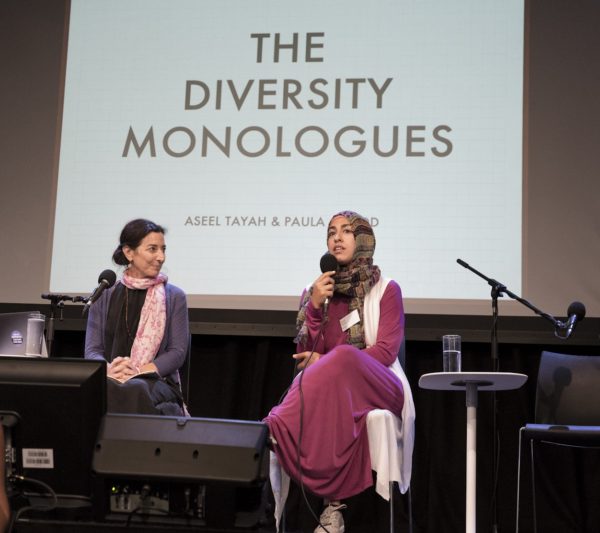 After years of talking about diversity in the arts sector, it’s starting to feel like a monologue that only reaches an audience of our own communities, say Dr Paula Abood and Aseel Taya, a Palestinian creative director and installation artist. Aseel says when applying for arts funding, the process is not tolerant of people from migrant backgrounds and even less accommodating for those pitching art that is deemed not “relevant” for Australian audiences. Dr Paula Abood is a writer, creative producer and educator, and a leading figure in the space for 30 years. She’s calling for the entire funding regime to be restructured because currently the major organisations take the bulk of the money while the small-to-medium sector, where diversity flourishes, is left with the crumbs. Tune into this week’s Fair Play episode of The Colour Cycle Podcast.
After years of talking about diversity in the arts sector, it’s starting to feel like a monologue that only reaches an audience of our own communities, say Dr Paula Abood and Aseel Taya, a Palestinian creative director and installation artist. Aseel says when applying for arts funding, the process is not tolerant of people from migrant backgrounds and even less accommodating for those pitching art that is deemed not “relevant” for Australian audiences. Dr Paula Abood is a writer, creative producer and educator, and a leading figure in the space for 30 years. She’s calling for the entire funding regime to be restructured because currently the major organisations take the bulk of the money while the small-to-medium sector, where diversity flourishes, is left with the crumbs. Tune into this week’s Fair Play episode of The Colour Cycle Podcast.
Episode 6: Take it from the Top
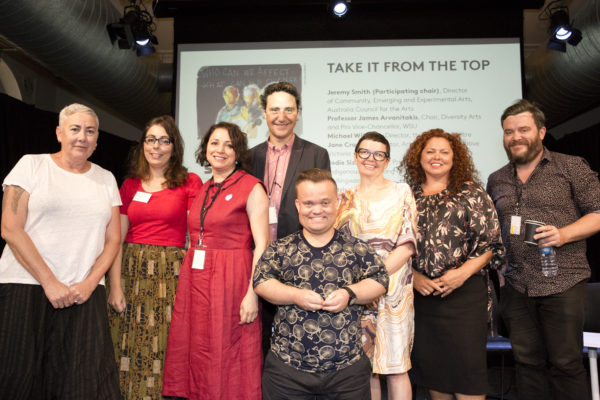 In the creative sector, the most visible marker of power can be seen by who occupies positions of leadership, who is on the boards, who judges the awards and runs the company? Who hires? Who dispenses funds? Who signs off on the program or decides what work gets made? Tune in to the “Take it from the Top” panel at the Fair Play Symposium in Melbourne – hosted by Diversity Arts Australia. Panelists include: Jodie Sizer (Co-CEO – Price Waterhouse Coopers Indigenous Consulting); Jeremy Smith (former Director -Community, Emerging & Experimental Arts at the Australia Council for the Arts); Koraly Dimitriadis (Cypriot-Australian poet, writer, actor & performer); Jane Crawley (Director – Arts Investment, Creative Victoria); Michael William (former Director – The Wheeler Centre); Katrina Segdewick (CEO – the Australian Centre for the Moving Image (ACMI) and Professor James Arvanitakis (former Chair – Diversity Arts Australia & pro Vice Chancellor – Western Sydney University).
In the creative sector, the most visible marker of power can be seen by who occupies positions of leadership, who is on the boards, who judges the awards and runs the company? Who hires? Who dispenses funds? Who signs off on the program or decides what work gets made? Tune in to the “Take it from the Top” panel at the Fair Play Symposium in Melbourne – hosted by Diversity Arts Australia. Panelists include: Jodie Sizer (Co-CEO – Price Waterhouse Coopers Indigenous Consulting); Jeremy Smith (former Director -Community, Emerging & Experimental Arts at the Australia Council for the Arts); Koraly Dimitriadis (Cypriot-Australian poet, writer, actor & performer); Jane Crawley (Director – Arts Investment, Creative Victoria); Michael William (former Director – The Wheeler Centre); Katrina Segdewick (CEO – the Australian Centre for the Moving Image (ACMI) and Professor James Arvanitakis (former Chair – Diversity Arts Australia & pro Vice Chancellor – Western Sydney University).
Episode 7: Building Aboriginal Cultural Competency
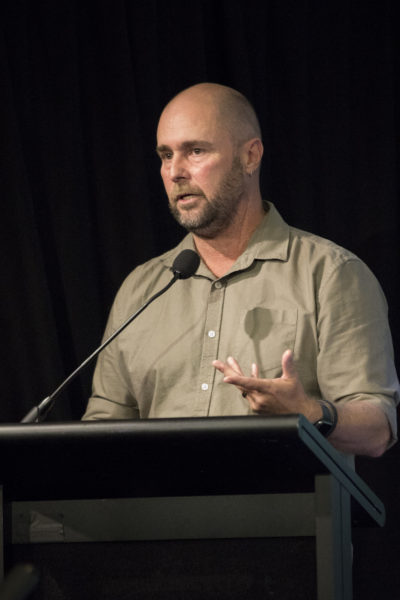 Diversity and inclusion employment practices are often focused on recruitment, but not on retention. Promoting cultural competency in the creative sector is a step towards creating safe spaces that foster and encourage equity. In his keynote at the Fair Play symposium, Rob Hyatt from the Koorie Heritage Trust talks about the importance of identity in workplaces, and specifically addresses the arts sector in his keynote about cultural safety and inclusion.
Diversity and inclusion employment practices are often focused on recruitment, but not on retention. Promoting cultural competency in the creative sector is a step towards creating safe spaces that foster and encourage equity. In his keynote at the Fair Play symposium, Rob Hyatt from the Koorie Heritage Trust talks about the importance of identity in workplaces, and specifically addresses the arts sector in his keynote about cultural safety and inclusion.
Rob explains the importance of identity and connection to Aboriginality through heart and mind.
Episode 8: Learning from Frida
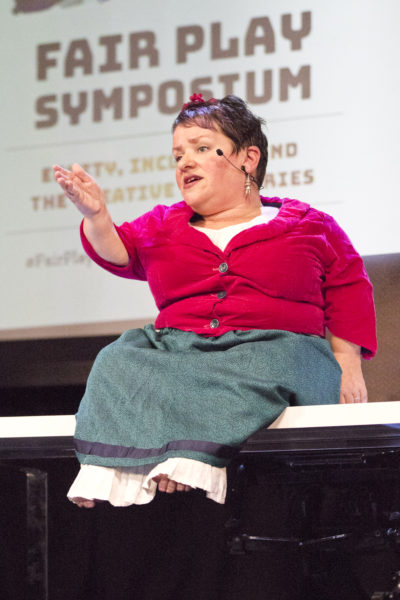 In 2014, Caroline Bowditch premiered a dance theatre performance called “Falling in Love with Frida” with both disabled and non-disabled performers, and sign language interpretation embedded at its centre, the award-winning and critically acclaimed piece was shown 93 times to sold-out audiences across the UK and internationally. In this keynote address, Executive Director of Arts Access Victoria Caroline Bowditch performs a monologue from this piece and then talks about her obsession with Frida Kahlo. She also talks about why it’s important to reclaim Frida Kahlo as a disabled artist, and why her work doesn’t focus on accepted mainstream conventions.
In 2014, Caroline Bowditch premiered a dance theatre performance called “Falling in Love with Frida” with both disabled and non-disabled performers, and sign language interpretation embedded at its centre, the award-winning and critically acclaimed piece was shown 93 times to sold-out audiences across the UK and internationally. In this keynote address, Executive Director of Arts Access Victoria Caroline Bowditch performs a monologue from this piece and then talks about her obsession with Frida Kahlo. She also talks about why it’s important to reclaim Frida Kahlo as a disabled artist, and why her work doesn’t focus on accepted mainstream conventions.
Episode 9: Learning from each other
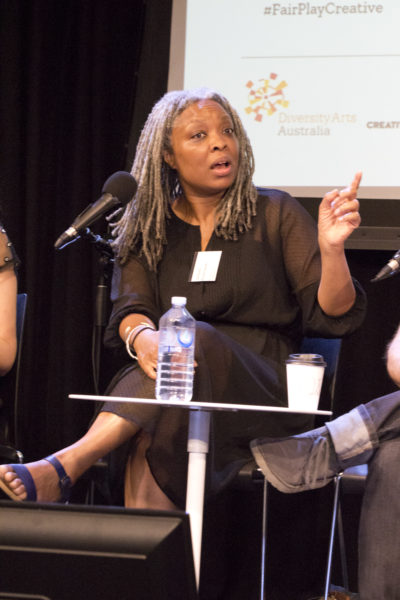 Genuine diverse leadership has the potential for the audiences who are engaging with culture to see themselves, their narratives and histories, reflected in what they see and experience. This panel discussion includes arts leaders from the UK and Australia who participated in the inaugural year of the INTERSECT program. INTERSECT is a joint British Council and Diversity Arts Australia knowledge exchange that aims to strengthen international collaboration and connections between diverse and indigenous arts leaders in both countries. Featured panelists: Anna Hay (Participating Chair – British Council Australia), Adelaide Bannerman, Candy Bowers (Black Honey Company), Jacob Boehme (Yirramboi Festival), Mikala Tai (4A Centre for Contemporary Asian Art), Abdul Shayek (Fio), Natalie Ibu (Tiata fahodzi).
Genuine diverse leadership has the potential for the audiences who are engaging with culture to see themselves, their narratives and histories, reflected in what they see and experience. This panel discussion includes arts leaders from the UK and Australia who participated in the inaugural year of the INTERSECT program. INTERSECT is a joint British Council and Diversity Arts Australia knowledge exchange that aims to strengthen international collaboration and connections between diverse and indigenous arts leaders in both countries. Featured panelists: Anna Hay (Participating Chair – British Council Australia), Adelaide Bannerman, Candy Bowers (Black Honey Company), Jacob Boehme (Yirramboi Festival), Mikala Tai (4A Centre for Contemporary Asian Art), Abdul Shayek (Fio), Natalie Ibu (Tiata fahodzi).
Episode 10: The politics of intersectionality
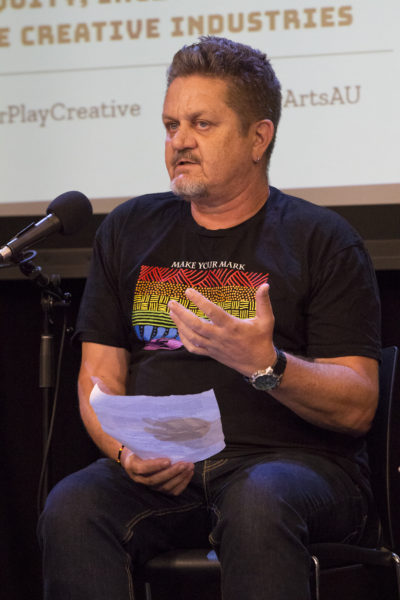 Intersectionality can mean different things for different people and can be applied across a range of settings and in different ways it enables us to understand identity as a complex multi-dimensional category but it can also be an approach to the way we move and work in the world. And as a practice it provides a foundation for working critically, sensitively and with nuance in the arts. This panel: Eugenia Flynn, Creative Producer of the Fair Play Symposium; Azizeh Astaneh, a visual artist, graphic designer and founding president of Melbourne Artists for Asylum Seekers; Dominic Golding, an artist and a community worker who has worked with refugees, migrants, and people with disability; Peter Waples Crowe, a Ngarigo queer visual and performing artist, and Aboriginal Health worker; and Jax Jacki Brown, disability and LGBTIQ+ rights activist and Publishability Project Officer at Writers Victoria. Our final episode for Season 2 is here! Keep an eye on our social media for Season 3 news in the future.
Intersectionality can mean different things for different people and can be applied across a range of settings and in different ways it enables us to understand identity as a complex multi-dimensional category but it can also be an approach to the way we move and work in the world. And as a practice it provides a foundation for working critically, sensitively and with nuance in the arts. This panel: Eugenia Flynn, Creative Producer of the Fair Play Symposium; Azizeh Astaneh, a visual artist, graphic designer and founding president of Melbourne Artists for Asylum Seekers; Dominic Golding, an artist and a community worker who has worked with refugees, migrants, and people with disability; Peter Waples Crowe, a Ngarigo queer visual and performing artist, and Aboriginal Health worker; and Jax Jacki Brown, disability and LGBTIQ+ rights activist and Publishability Project Officer at Writers Victoria. Our final episode for Season 2 is here! Keep an eye on our social media for Season 3 news in the future.
Season 2 - List of episodes
-
First Peoples First
-
Towards Creative Sector Self-Determination
-
Diversifying Screen and Stage – Deborah Williams
-
State of play: Equity and Inclusion
-
The Diversity Monologues
-
Take it from the Top
-
Building Aboriginal Cultural Competency
-
Learning from Frida
-
Learning from each other
-
The Politics of Intersectionality
Introducing the Colour Cycle
The Colour Cycle aims to disrupt cultural whitewashing and examines whether Australia’s Arts and Cultural sector looks like Australia. Join the conversation on your socials with #TheColourCycle.
Listen to a short Intro:
The Colour Cycle – Season 1
Episode 1: Creating new reflections
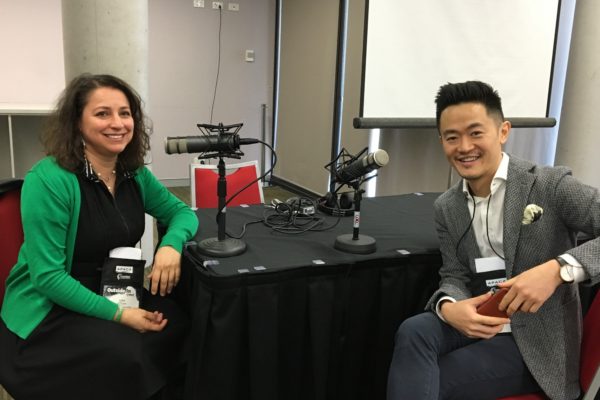 What does it feel like to grow up without seeing yourself reflected on TV? Screenwriter Benjamin Law describes this exclusion as ‘quietly dehumanising’ and a form of ‘structural racism’. He talks about his comedy series The Family Law changing the face of our TV screens – about casting the predominantly Asian-Australian characters, why quotas work and creating new opportunities and new reflections for writers of colour in Australia.
What does it feel like to grow up without seeing yourself reflected on TV? Screenwriter Benjamin Law describes this exclusion as ‘quietly dehumanising’ and a form of ‘structural racism’. He talks about his comedy series The Family Law changing the face of our TV screens – about casting the predominantly Asian-Australian characters, why quotas work and creating new opportunities and new reflections for writers of colour in Australia.
Listen now to Episode 1:
Episode 2: Making spaces for refugee artists
We talk a lot about the challenges for artists of colour to break into the arts sector and the pervasive stereotypes they face. But what if you’re also trying to manage the added difficulties of language barriers, work and trauma as a recently arrived refugee to Australia? Meet the extraordinary Carolina Triana who has created huge opportunities for artists from refugee backgrounds by establishing the New Beginnings Festival.
Episode 3: Art and Identity politics: What is the Australian voice?
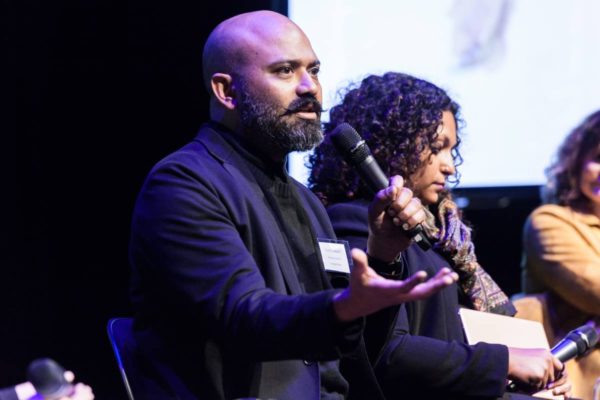 The great Australian author David Malouf is never referred to as the Great-Lebanese-Gay-Australian author. So do non-Anglo artists always have to represent the cultural identity of their parents or their birthplace? Author and TV and radio host Sunil Badami talks about identity politics, and asks, what is the Australian voice and who does it belong to?
The great Australian author David Malouf is never referred to as the Great-Lebanese-Gay-Australian author. So do non-Anglo artists always have to represent the cultural identity of their parents or their birthplace? Author and TV and radio host Sunil Badami talks about identity politics, and asks, what is the Australian voice and who does it belong to?
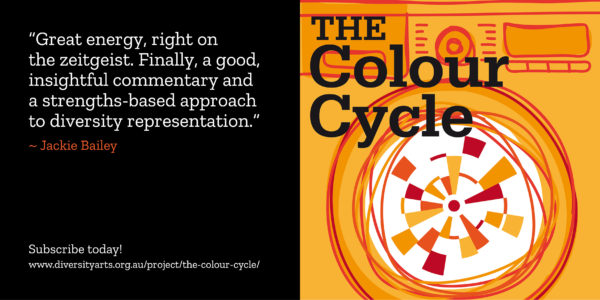
Episode 4: Making art in exile
We know that people are moving around the world and fleeing persecution, fleeing environmental disaster at a rate that has never before happened in history. Damon Amb was unable to practice his craft in his home country for fear of persecution. He speaks about his journey as a refugee and how he is now working to rebuild his life and re-establish his artistic practice in a new country.
Episode 5: Changing the narrative
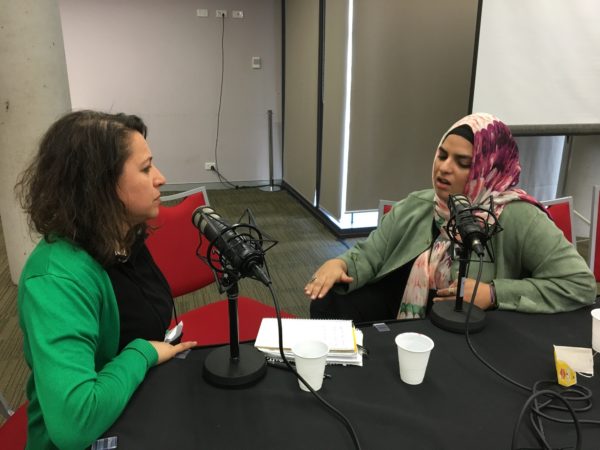 Zainab Syed is a performance poet from Pakistan, she wears a headscarf so people assume she’s a refugee or has suffered hardship and that her work should reflect this. But her story is one of privilege. How do you change the stereotypes or assumptions made about artists of colour? We also meet Kevin Bathman whose work about the inter-marriages of Indian and Chinese couples in south-east Asia doesn’t fit easily into most boxes.
Zainab Syed is a performance poet from Pakistan, she wears a headscarf so people assume she’s a refugee or has suffered hardship and that her work should reflect this. But her story is one of privilege. How do you change the stereotypes or assumptions made about artists of colour? We also meet Kevin Bathman whose work about the inter-marriages of Indian and Chinese couples in south-east Asia doesn’t fit easily into most boxes.
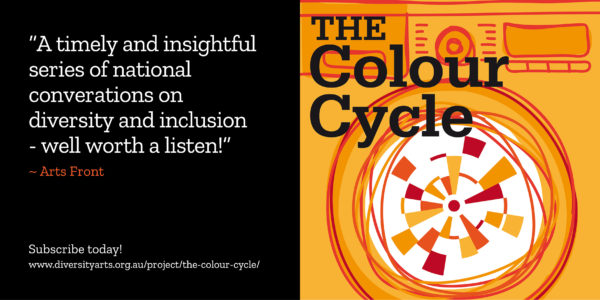
Episode 6: The Diversity of Australia’s First Peoples
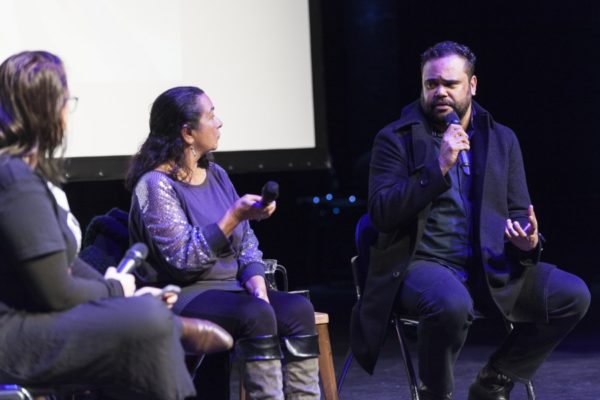 This ancient continent has been populated by diverse groups of people and artists from over 500 language groups and nations. But too often Australia’s indigenous artists are relegated into one box to tick. In this episode, we talk to two important indigenous artists, Lily Shearer and Colin Kinchella about what we can learn from the diversity of Australia’s first peoples
This ancient continent has been populated by diverse groups of people and artists from over 500 language groups and nations. But too often Australia’s indigenous artists are relegated into one box to tick. In this episode, we talk to two important indigenous artists, Lily Shearer and Colin Kinchella about what we can learn from the diversity of Australia’s first peoples
Bonus Episode: Australian Race Discrimination Commissioner Tim Soutphommasane
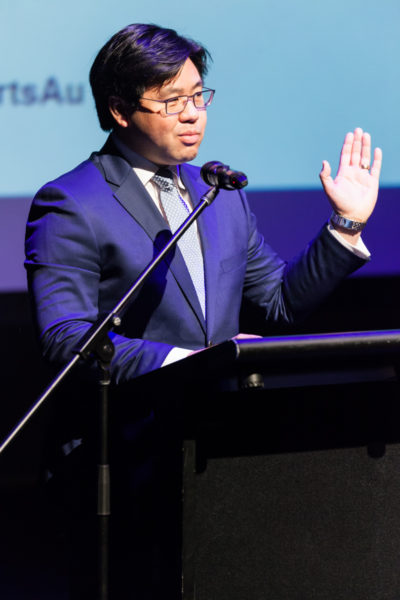 In our first bonus episode we bring you a live recording of the speech from Australia’s Race Discrimination Commissioner Dr Tim Soutphommosane, the Beyond Tick Boxes Symposium. It was so good we just had to share it with you. He challenges Australians to think about cultural diversity as more than just going out for souvlaki, dim suns or pho. Dr Soutphommosane also poses the question: is creative expression is a human right?
In our first bonus episode we bring you a live recording of the speech from Australia’s Race Discrimination Commissioner Dr Tim Soutphommosane, the Beyond Tick Boxes Symposium. It was so good we just had to share it with you. He challenges Australians to think about cultural diversity as more than just going out for souvlaki, dim suns or pho. Dr Soutphommosane also poses the question: is creative expression is a human right?
Bonus Episode: Are we there yet?
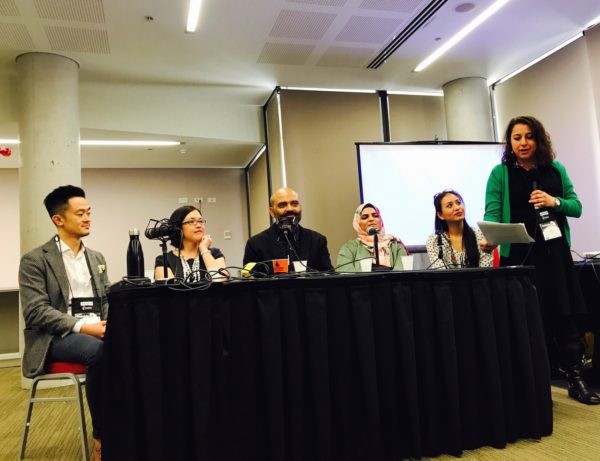 Over this podcast series we’ve heard lot’s of strategies for increasing cultural diversity in the arts and on our screens – so are we there yet? Well we’re on our way but still have a long way to go according to a panel discussion which Diversity Arts Australia hosted at the Performing Arts Connections Australia conference (Australia’s peak performing arts body for theatre, dance and performing arts). The panel included some Colour Cycle alumni; Sunil Badami, Benjamin Law, Zainab Syed, Maria Tran and Jackie Bailey.
Over this podcast series we’ve heard lot’s of strategies for increasing cultural diversity in the arts and on our screens – so are we there yet? Well we’re on our way but still have a long way to go according to a panel discussion which Diversity Arts Australia hosted at the Performing Arts Connections Australia conference (Australia’s peak performing arts body for theatre, dance and performing arts). The panel included some Colour Cycle alumni; Sunil Badami, Benjamin Law, Zainab Syed, Maria Tran and Jackie Bailey.
Bonus Episode: Where are the teeth? Arts leadership
We often talk about the need for quotas to compel arts organisations to include more diversity in their programming. When Create NSW’s Screen division introduced a 50:50 quota for gender they significantly increased the participation of female directors, writers and producers within a very short period of time. So could quotas work to create a more culturally diverse arts sector? This was a hot topic at the Beyond Tick Boxes symposium in 2017 with an animated panel discussion that we recorded live and nicknamed “Where are the teeth?”
Listen now:
Season 1 - List of episodes
-
Introducing The Colour Cycle
-
Creating new reflections
-
Making spaces for refugee artists
-
Art and Identity politics: What is the Australian voice?
-
Making art in exile
-
Changing the narrative
-
The diversity of Australia’s First Peoples?
-
Bonus episode – Australian Race Discrimination Commissioner Tim Soutphommasane
-
Bonus episode: Are we there yet?
-
Bonus episode: Where are the teeth? Arts leadership
“We want our podcast to open up the conversation about why our arts and screens don’t reflect Australia’s real cultural diversity. We’re also showcasing some brilliant artists and creative workers along the way.”
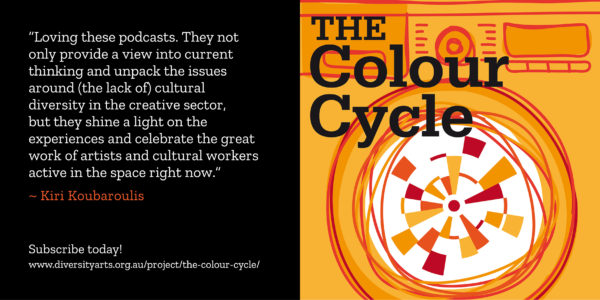
“Growing up without seeing yourself reflected back in your nation’s stories is a quietly dehumanising thing.”
Subscribe now to the Colour Cycle Podcast
Want great interviews on cultural diversity in Australian arts delivered to your phone?
